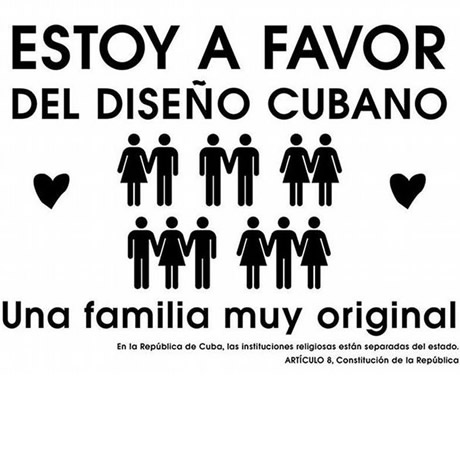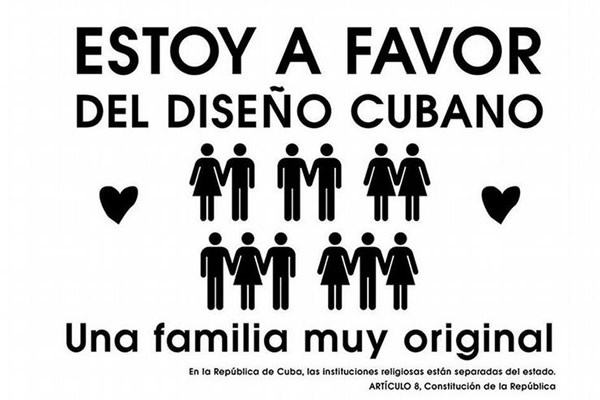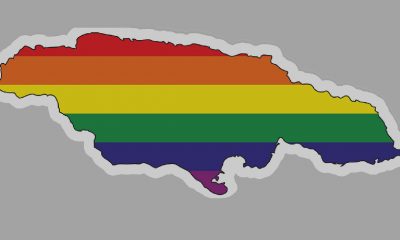News
Editorial: ‘El Orgullo LGBTI+ y la lucha por el matrimonio igualitario en Cuba’
Activistas han llegado a este mes del Orgullo más organizados que nunca


Los colectivos LGBTI+ de Cuba han llegado a este 28 de junio más organizados que nunca antes.
La Plataforma 11M, que es el grupo más activo, hizo gala de fuerza este mes con una besada virtual y un tuitazo a favor del matrimonio igualitario que se reeditará el 11 de cada mes, en referencia al 11 de mayo de 2019, cuando cientos de activistas y sus aliados marcharon en La Habana sin autorización.
El Orgullo que los movimientos LGBTI+ del mundo entero celebraron este domingo es una celebración de la rebeldía, a diferencia de otras conmemoraciones, como la del Día Internacional contra la Homofobia, la Transfobia y la Bifobia ―el 17 de mayo―, que se originó en un gesto institucional de la Organización Mundial de la Salud.
Mientras el 17 de mayo es una fecha que recuerda el triunfo del sentido común sobre los prejuicios culturales del discurso médico, el 28 de junio significa la rebeldía LGBTI+ sin concesiones. El acto de desobedecer.
Ninguna institución, ni siquiera los Estados, tiene derecho a enfermarnos o sanarnos, a igualarnos a todos o rebajarnos a una ciudadanía de segunda clase, según determine la voluntad política.
Las instituciones cubanas, que siguen patologizando los cuerpos trans y discriminando el acceso a la fertilización, por hablar solo de dos gestos reguladores, llevan años retardando la implementación en las leyes de matrimonios LGBTI+ que, no obstante, existen.
En la tradición patriarcal, existir más allá del Estado es un gran atrevimiento. En el mundo heterosexual, es el Estado quien decide qué eres. Se ocupa de reglamentarlo y registrarlo minuciosamente, siempre con el afán controlador y empobrecedor que es consustancial al origen y la práctica de los Estados.
Los maricones y tortilleras y travestis y trans nacimos en esa tradición. Vivimos en la paradoja de negar ese orden y a la vez, como forzosamente, sin más opción, querer asimilarnos a él.
Nosotras no tenemos patria.
Las patrias no son esencias, sino discursos. Y siempre, hasta ahora, ha sido el discurso de un grupo, de una clase o de una ideología que pretende prevalecer.
Ningún ideal de ciudadanía concebido desde los presupuestos nacionalistas tradicionales ha aportado siquiera un trato respetuoso para las comunidades LGBTI+ en Cuba ni en ninguna parte.
No obstante, como fuimos asimiladas a esos Estados sin que nos consultaran y recibimos de ellos, como una asignación incuestionable, un género y una orientación sexual, tenemos derecho a exigirles a estas alturas, al menos, un trato igualitario.
El matrimonio civil es un derecho alcanzado en la mayor parte del mundo desde el siglo XIX por las personas heterosexuales y afiliadas en general a las normas patriarcales.
Es, también, una institución reguladora que establece solamente una relación de esas parejas con el poder efectivo e implica una sumisión. Otras opciones de relacionarse o de constituir familias, por suerte, siguen funcionando al margen del sistema.
Pelear por el matrimonio igualitario, como ha hecho en Cuba la comunidad LGBTI+ con más empeño desde 2018, ha sido, sin embargo, la oportunidad más viable para desmantelar la vieja patria donde hemos vivido como inquilinos hasta ahora.
Los intentos de activismo sustentados por una sensibilidad “oficial”, como el emprendido por Mariela Castro y el Centro Nacional de Educación Sexual durante la última década, fracasaron precisamente por haber nacido sujetos al deseo de asimilarnos a un orden que nos excluye, sin comprender la naturaleza histórica de esa relación opresiva.
Sin revisar y cuestionar abiertamente la homofobia y transfobia de Estado, no solo cultural sino política, ejercida en Cuba hasta el presente, las comunidades LGBTI+ no tienen ninguna oportunidad de conseguir ni siquiera la igualdad sometida que pudiéramos obligar al poder a otorgarnos.
El Orgullo LGBTI+ debería ser la fiesta de quienes ya superaron la tentación de asimilarse y, si van a pelear en el terreno del Estado, fingirán que aspiran a incluirse en las reglas para ganar pequeñas victorias.
El matrimonio igualitario es la meta de ahora. Y hay que lograrlo sin referendo, a pesar de la norma establecida por el parlamento cubano con el propósito de buscar un consenso injusto, por razones no solo prácticas.
El matrimonio igualitario no nos dará una patria, pero hará más habitable la patria que nos impusieron. Con esa certeza hay que ir por él.
Virginia
Arlington LGBTQ bar Freddie’s celebrates 25th anniversary
Owner asks public to support D.C.-area gay bars

An overflowing crowd turned out Sunday night, March 1, for the 25th anniversary celebration of Freddie’s Beach Bar, the LGBTQ bar and restaurant located in the Crystal City section of Arlington, Va.
The celebration began as longtime patrons sitting at tables and at the bar ordered drinks, snacks, and full meals as several of Freddie’s well-known drag queens performed on a decorated stage.
Roland Watkins, an official with Equality NoVa, an LGBTQ advocacy organization based in the Northern Virginia areas of Arlington, Alexandria, and Fairfax County, next told the gathering about the history of Freddie’s Beach Bar and the role he said that owner Freddie Lutz has played in broadening the bar’s role into a community gathering place.
“Twenty-five years ago, opening a gay bar in Arlington was not a given,” Watkins told the crowd from the stage. “It took courage, convincing, and a deep belief that our community belongs openly, visibly, and proudly,” he said. “And that belief came from Freddie.”
Watkins and others familiar with Freddie’s noted that under Lutz’s leadership and support from his staff, Freddie’s provided support and a gathering place for LGBTQ organizations and a place where Virginia elected officials, and candidates running for public office, came to express their support for the LGBTQ community.
“Over the past 25 years, Freddie’s has become more than a bar,” Watkins said. “It has become a community maker.”
Lutz, who spoke next, said he was moved by the outpouring of support from long-time customers. “Thank you all so much for coming tonight and thank you all so much for your support over the past 25 years,” he said. “I can’t tell you how much that means to me and how much it’s kept me going.”
But Lutz then said Freddie’s, like many other D.C. area gay bars, continues to face economic hard times that he said began during the COVID pandemic. He noted that fewer customers are coming to Freddie’s in recent years, with a significant drop in patronage for his once lucrative weekend buffet brunches.
“So, I don’t want to be the daddy downer on my 25-year anniversary,” he said. “But this was actually the worst year we’ve ever had,” he added. “And I guess what I’m asking is please help us out. Not just me, but all the gay bars in the area.” He added, “I’m reaching out and I’m appealing to you not to forget the gay bars.”
Lutz received loud, prolonged applause, with many customers hugging him as he walked off the stage.

The Comings & Goings column is about sharing the professional successes of our community. We want to recognize those landing new jobs, new clients for their business, joining boards of organizations and other achievements. Please share your successes with us at [email protected].
Congratulations to Gil Pontes III on his recent appointment to the Financial Advisory Board for the City of Wilton Manors, Fla. Upon being appointed he said, “I’m honored to join the Financial Advisory Board for the City of Wilton Manors at such an important moment for our community. In my role as Executive Director of the NextGen Chamber of Commerce, I spend much of my time focused on economic growth, fiscal sustainability, and the long-term competitiveness of emerging business leaders. I look forward to bringing that perspective to Wilton Manors — helping ensure responsible stewardship of public resources while supporting a vibrant, inclusive local economy.”
Pontes is a nonprofit executive with years of development, operations, budget, management, and strategic planning experience in 501(c)(3), 501(c)(4), and political organizations. Pontes is currently executive director of NextGen, Chamber of Commerce. NextGen Chamber’s mission is to “empower emerging business leaders by generating insights, encouraging engagement, and nurturing leadership development to shape the future economy.” Prior to that he served as managing director of The Nora Project, and director of development also at The Nora Project. He has held a number of other positions including Major Gifts Officer, Thundermist Health Center, and has worked in both real estate and banking including as Business Solutions Adviser, Ironwood Financial. For three years he was a Selectman, Town of Berkley, Mass. In that role, he managed HR and general governance for town government. There were 200+ staff and 6,500 constituents. He balanced a $20,000,000 budget annually, established an Economic Development Committee, and hired the first town administrator.
Pontes earned his bachelor’s degree in political science from the University of Massachusetts, Dartmouth.
Kansas
ACLU sues Kansas over law invalidating trans residents’ IDs
A new Kansas bill requires transgender residents to have their driver’s licenses reflect their sex assigned at birth, invalidating current licenses.

Transgender people across Kansas received letters in the mail on Wednesday demanding the immediate surrender of their driver’s licenses following passage of one of the harshest transgender bathroom bans in the nation. Now the American Civil Liberties Union is filing a lawsuit to block the ban and protect transgender residents from what advocates describe as “sweeping” and “punitive” consequences.
Independent journalist Erin Reed broke the story Wednesday after lawmakers approved House Substitute for Senate Bill 244. In her reporting, Reed included a photo of the letter sent to transgender Kansans, requiring them to obtain a driver’s license that reflects their sex assigned at birth rather than the gender with which they identify.
According to the reporting, transgender Kansans must surrender their driver’s licenses and that their current credentials — regardless of expiration date — will be considered invalid upon the law’s publication. The move effectively nullifies previously issued identification documents, creating immediate uncertainty for those impacted.
House Substitute for Senate Bill 244 also stipulates that any transgender person caught driving without a valid license could face a class B misdemeanor, punishable by up to six months in jail and a $1,000 fine. That potential penalty adds a criminal dimension to what began as an administrative action. It also compounds the legal risks for transgender Kansans, as the state already requires county jails to house inmates according to sex assigned at birth — a policy that advocates say can place transgender detainees at heightened risk.
Beyond identification issues, SB 244 not only bans transgender people from using restrooms that match their gender identity in government buildings — including libraries, courthouses, state parks, hospitals, and interstate rest stops — with the possibility for criminal penalties, but also allows for what critics have described as a “bathroom bounty hunter” provision. The measure permits anyone who encounters a transgender person in a restroom — including potentially in private businesses — to sue them for large sums of money, dramatically expanding the scope of enforcement beyond government authorities.
The lawsuit challenging SB 244 was filed today in the District Court of Douglas County on behalf of anonymous plaintiffs Daniel Doe and Matthew Moe by the American Civil Liberties Union, the ACLU of Kansas, and Ballard Spahr LLP. The complaint argues that SB 244 violates the Kansas Constitution’s protections for personal autonomy, privacy, equality under the law, due process, and freedom of speech.
Additionally, the American Civil Liberties Union filed a temporary restraining order on behalf of the anonymous plaintiffs, arguing that the order — followed by a temporary injunction — is necessary to prevent the “irreparable harm” that would result from SB 244.
State Rep. Abi Boatman, a Wichita Democrat and the only transgender member of the Kansas Legislature, told the Kansas City Star on Wednesday that “persecution is the point.”
“This legislation is a direct attack on the dignity and humanity of transgender Kansans,” said Monica Bennett, legal director of the ACLU of Kansas. “It undermines our state’s strong constitutional protections against government overreach and persecution.”
“SB 244 is a cruel and craven threat to public safety all in the name of fostering fear, division, and paranoia,” said Harper Seldin, senior staff attorney for the ACLU’s LGBTQ & HIV Rights Project. “The invalidation of state-issued IDs threatens to out transgender people against their will every time they apply for a job, rent an apartment, or interact with police. Taken as a whole, SB 244 is a transparent attempt to deny transgender people autonomy over their own identities and push them out of public life altogether.”
“SB 244 presents a state-sanctioned attack on transgender people aimed at silencing, dehumanizing, and alienating Kansans whose gender identity does not conform to the state legislature’s preferences,” said Heather St. Clair, a Ballard Spahr litigator working on the case. “Ballard Spahr is committed to standing with the ACLU and the plaintiffs in fighting on behalf of transgender Kansans for a remedy against the injustices presented by SB 244, and is dedicated to protecting the constitutional rights jeopardized by this new law.”




















